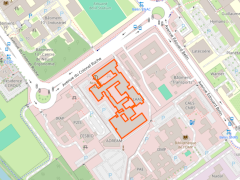Stage
M2 internship/Stage de M2: Development of gut-on-chip modules and biophysical study of epithelium
Date de publication
13.10.25
Prise de poste souhaitée
02.02.26
Subject:
The external layer of the gut is composed of a tight monolayer of cells, called an epithelium, whose function is to absorb the nutrients while avoiding the translocation of pathogens or particles from the lumen of the gut to the blood network. In the light of the worrying increasing of micro and nanoplastics presence in the environment and food, in vitro models of the gut barrier have to be set up to study in more details the possible translocation of nanoplastics through the gut epithelium.
For that, an organ-on-chip system has to be developed, with the following parts:
- Substrates allowing an efficient cell culture with a high density of large pores (for nanoplastics translocation).
- Modules allowing the culture, imaging and fluidic stimulation of the gut epithelium.
An important point is that these substrates and modules should not leach any micro or nanoplastics: new material and fabrication techniques has to be tested.
In this internship, the candidate will study 3D printed microfluidic modules allowing cell culture, confocal microscopy, TEER measurements and fluidic stimulation of gut epithelium. Design and fluidic characterization of the modules is planned, and the impact of these modules on the epithelium growth and differentiation will be checked. Different substrates will be tested, including track-edge membranes, hydrogels and 3D printed membranes.
Continuation as a PhD project is expected, where the translocation of nanoplastics through these models will be studied.
Tasks and techniques:
During this internship, training on several techniques will be offered, including:
- Cell culture and staining
- Confocal microscopy
- 3D printing (stereolithography)
- Microfluidics
- Depending on the progress, high resolution 3D-printing and clean room fabrication
Biomedical and bio-engineering profiles with skills and knowledge in cell biology, micro/nanofabrication and/or microfluidics are welcome.
Location and duration:
The ELiA team is a research team specialized in in vitro systems for the study of the cell and tissue microenvironment, hosted in the LAAS-CNRS laboratory in Toulouse, France. The LAAS-CNRS is a large academic laboratory with 700 researchers, engineers, PhD students and interns and large facilities including a large clean room and biology cell culture areas. This work will be performed in the frame of a collaboration with Audrey Ferrand (I2MC, Toulouse).
The internship is planned for a 6 months duration, starting February 2026 with a monthly allowance around 600€.
Contacts
LAAS-CNRS: Dr Bastien Venzac (bastien.venzac@laas.fr)












